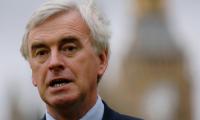Peter Francis, former member of an undercover Scotland Yard unit, discloses that he spied on members of five trade unions and apologises unreservedly
An undercover police unit that monitored political groups over 40 years gathered intelligence on members of at least five trade unions, a whistleblower has revealed.
Peter Francis, who spent four years undercover infiltrating political activists, has named five trade unions whose members he spied on. He said they were Unison, the Fire Brigades Union, Communication Workers Union, National Union of Teachers, and the National Union of Students.
Francis, who has become a whistleblower in recent years, told a meeting in Parliament last night that he apologised “unreservedly to all the union members I personally spied on and reported back on whilst deployed undercover”.
He has promised to give evidence to the public inquiry that home secretary Theresa May has ordered into undercover policing. On Thursday, May announced that the inquiry into what she called the “failings” of the undercover operations will be led by a senior judge, Lord Justice Pitchford.
In the 1990s, Francis went undercover to infiltrate the anti-racist movement and Militant, the left-wing group that became the Socialist Party in 1997.
He was part of the covert Metropolitan police unit, the Special Demonstration Squad (SDS), that monitored hundreds of political groups between 1968 and 2008.
Last night, Francis gave a statement to a packed meeting in Parliament that marked the launch of a new book about the blacklisting of thousands of workers by multi-national construction firms.
The book, Blacklisted : the Secret War between Big Business and Union Activists (by Dave Smith and Phil Chamberlain), describes evidence of how police covertly shared information about trade unionists with the blacklisters.
Francis has revealed how he believes that he personally collected some of the intelligence that was stored on the blacklisting files.
In his statement that was read to the meeting by Labour MP John McDonnell, Francis offered to give evidence in any court case the unions and blacklisted workers may bring.
Francis added that the public inquiry headed by Lord Justice Pitchford should examine the blacklisting files alongside the police’s records of campaigners to “look at the areas of collusion”. The remit of the inquiry will be announced in July, following consultation with those who were subjected to the surveillance and others.
This month, the Daily Mirror revealed that one of the undercover officers in the SDS, Mark Jenner, posed as a joiner and was a member of the construction workers union, UCATT, for three years.
Jenner’s involvement in trade unions is detailed here by the Undercover Research Group, a resource on covert infiltration of political groups.
It describes how he attended meetings of UCATT and other unions, regularly went on pickets and ferried trade unionists to demonstrations.
While undercover, Jenner had a four-year relationship with a woman who did not know his real identity. He was unmasked sometime ago - for more background, see this and this.
The Metropolitan Police routinely says that it will neither confirm nor deny the identities of any of its undercover officers.
However in his statement read out by McDonnell last night, Francis said :”Let me state very clearly that Mark Jenner was 100% one of my fellow undercover SDS police officers deployed alongside me in the 1990s.”
He added that Jenner must be called to the public inquiry “to account for his spying on, amongst numerous other political protesters, the totally law-abiding construction union UCATT members whose only ‘crimes’ were being union members.”
The public inquiry which will be led by Lord Justice Pitchford will have the power to compel witnesses to give evidence.

